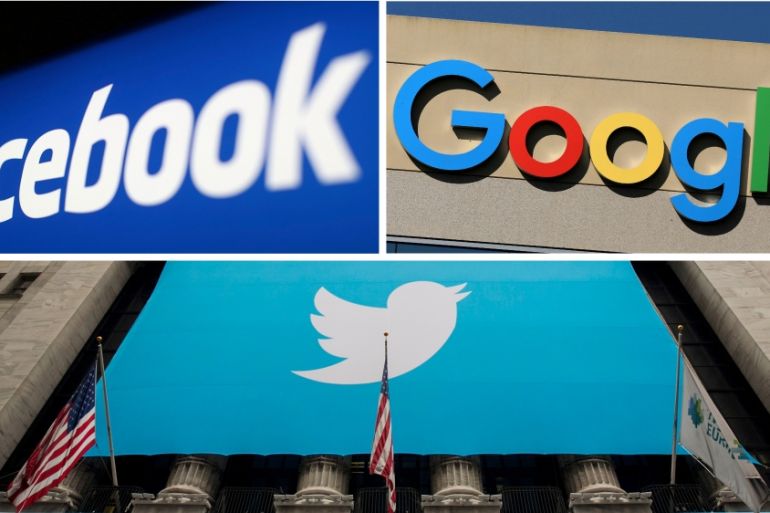Tech giants not keeping political ad promises, says privacy group
Privacy International said Facebook, Google and Twitter lack transparency on targeted political advertising.

Facebook, Twitter and Alphabet’s Google have failed to provide adequate transparency for global users around political advertising on their services, a privacy advocacy group has said.
A report from London-based charity Privacy International said that many users around the world lacked meaningful insight into how ads were targeted on social media services.
Keep reading
list of 4 itemsRare deep-sea squid filmed by scientists
Palestinian life under Israeli occupation: An illustrated guideThis article will be opened in a new browser window
Boeing’s jets turn 70: A timeline of highs, lows and turbulence
The group called Google “especially deficient” in disclosure of information about targeting, which enables advertisers to deliver tailored messages to different groups of users.
Google spokeswoman Alex Krasov said: “We know there is more work to be done and we’re looking at ways to bring more political ads transparency to more regions and more types of elections.”
Big internet companies have been sharing more information around political advertising following scrutiny after United States intelligence agencies found that Russia had targeted American voters with social media content, including ads, to try and influence the 2016 US elections. Russia has denied the allegations.
A Facebook spokesman said that the company had tightened its rules on political advertising in recent years and improved transparency on both Facebook and Instagram.
Twitter did not reply to Reuters’ requests for comment on the new report.
Privacy International’s criticisms come ahead of a European Commission report, due by the end of the year, on the tech companies’ commitments to its self-regulatory Code of Practice on Disinformation.
The companies and trade bodies for the advertising industry signed up to the European Commission’s voluntary measures in October 2018 to ward off more heavy-handed legislation.
As part of recent transparency efforts, Facebook, Twitter and Google have all launched searchable online libraries of political ads on their platforms, but these have been criticised by researchers for being poorly maintained and failing to provide useful ad targeting information.
“Companies that rely on people’s data to establish their market dominance should give all users heightened ad transparency, and transparency into the targeting and funding of ads should be meaningful,” said Sara Nelson, a spokeswoman for Privacy International.
The new report singled out Google for not having defined what it considers to be “political issues”, saying this rendered transparency into ads on such issues on the site less meaningful.
It also argued that as Twitter, outside of the US, does not give the same level of transparency to “promoted tweets” as it does to political ads, these paid-for tweets run without the heightened transparency they warrant.
In the US, Senators Amy Klobuchar and Mark Warner have been pushing for the introduction of the Honest Ads Act, which would require platforms to disclose the purchasers of ads, applying the same rules that exist for TV and radio.
“A patchwork of voluntary measures from tech companies isn’t sufficient – we need to pass the Honest Ads Act,” Klobuchar said in a statement last month when tech company Snap, which owns disappearing messaging app Snapchat, released its own political ad spending data last month.
Some platforms, such as Chinese company ByteDance’s TikTok and photo-sharing site Pinterest, do not allow political ads on their platforms.